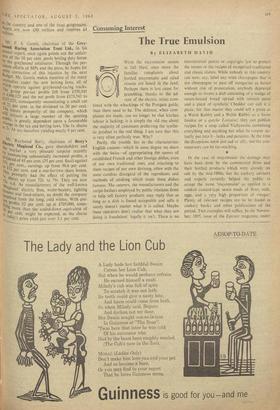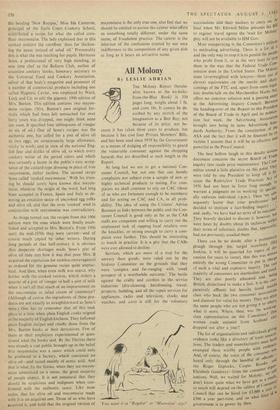Consuming Interest
The True Emulsion
By ELIZABETH DAVID Wins the mayonnaise season in full blast, once more the familiar complaints about bottled mayonnaise and salad creams are heard in the land. Perhaps there is less cause for grumbling, thanks to the ad- vent of the electric mixer.com- bined with the whackings of the Postgate guide, than there used to be. The defence; when com- plaints are made, can no longer be that kitchen labour is lacking; it is simply the old one about the majority of customers preferring the synthe- tic product to the real thing. I am sure that this is very often perfectly true. Why?
Partly, the trouble lies in the characteristic English custom—which in some degree we share with the Swiss—of appropriating the names of established French and other foreign dishes, even of our own traditional ones, 'and attaching to them recipes of our own devising, often with the most carefree disregard of the ingredients and methods of cooking which made these dishes famous. The caterers, the manufacturers and the recipe-hashers employed by public relations firms to help sell factory products may reply that as long as a dish is found acceptable and sells it surely doesn't matter what it is called. Maybe these operators don't realise that what they are doing is fraudulent; legally it isn't. There is no international patent or copyright law to protect the names or the recipes of recognised traditional and classic dishes. While nobody in this country can now, say, label any wine champagne that is not champagne or pass off margarine as butter without risk of prosecution, anybody depraved enough to invent a dish consisting of a wedge of steam-heated bread spread with tomato paste and a piece of synthetic Cheddar can call it a pizza; for that matter they could sell a pizza as a Welsh Rabbit and a Welsh Rabbit as a Swiss • fondue or a quiche Lorraine; they can publish recipes for a soup called Vichyssoise containing everything and anything but what its creator ac- tually
put into it—leeks and potatoes. At the time the deceptions seem just sad or sill), but the con- sequences can be far-reaching.
In the case of mayonnaise the damage may have been done by the commercial firms and their bottled products which were already on sale by the mid-1880s, but the cookery advisers and experts certainly helped the public to accept the name 'mayonnaise' as applied to a cooked custard-type sauce made of flour, milk, eggs, and a very high proportion of vinegar. Plenty of relevant recipes are to be found in cookery books and other publications of the period. Two examples will suffice. In the Novem- ber, 1895, issue, of the Epicure magazine, under
the heading 'New Recipes,' Miss Ida Cameron, principal of the Earls Court Cookery School, contributed a recipe for what she called corn- flour mayonnaise. The lady explained that in this cooked mixture the cornflour 'does for thicken- ing the sauce instead of salad oil.' Presumably this is what she was teaching her pupils. Hermann Senn. a professional of very high standing, at one time chef to the Reform Club, author of countless cookery books, honorary secretary to the Universal Food and Cookery Association, editor of that body's magazine and promoter of a number of commercial products including one called Hygienic Caviar, was employed by Ward, Lock and Co. to edit the gigantic 1906 edition of Mrs. Beeton. This edition contains two mayon- naise recipes. (Mrs. Beeton's own original for- mula which had been .left untouched for over forty years was dropped, one might think none too soon. It specified four tablespoons of vinegar to six of oil.) One of Senn's recipes was the authentic one, but called for a pint of olive oil to two eggs, an unnecessarily large allowance, tricky to work; and in view of the national Eng- lish fear and dislike of olive oil, to which every cookery writer of the period refers and which was certainly a factor in the public's easy accep- tance of the custard-type dressing in place of true mayonnaise, rather tactless. The second recipe Senn called 'cooked mayonnaise.' With his train- ing he should surely have known that mayon- naise, whatever the origin of the word, had long been accepted in France, Spain and Italy as de- noting an emulsion sauce of uncooked egg yolks and olive oil, and that the term 'cooked' used in conjunction with mayonnaise was contradictory.
As things turned out, the recipes from this 1906 edition were the ones which were finally estab- lished and accepted as Mrs. Beeton's. From 1906 until the mid-1950s they were current—and of course much - copied by other writers. During long periods of that half-century it is obvious that desperate shortages made Senn's pint of olive oil (one sees how it was that poor Mrs. B acquired the reputation for reckless extravagance) as ordered for the genuine recipe quite unprac-
tical. And then, when even milk was scarce, why
bother with the cooked version, which orders a quarter of a pint of vinegar to half a pint of milk
when it isn't all that much of an improvement on the mayonnaise or salad cream of commerce? (Although of course the ingredients of these pro- ducts are not exactly as straightforward as Senn's were.) One has to remember that all this took place at a time when plain English cooks reigned in the majority of English kitchens. They followed plain English recipes and chiefly those from the Mrs. Beeton books or their derivatives. Few of them or their employers experimented or ques- tioned what the books said. By the Thirties there was already a vast public brought up in the belief that mayonnaise was a sauce which could only be produced in a factory, which contained no olive oil—and tasted mainly of acetic acid. And that is what, by the Sixties, when they see mayon- naise announced on a menu, the great majority of people expect. It is not unnatural that they should be suspicious and indignant when con- fronted with the authentic sauce. Like most tastes. that for olive oil and mayonnaise made with it is an acquired one. Those of us who have acquired it, and hold that the original version of 'You want it in "Regular" or "Mastodon" size?'
mayonnaise is the only true one, also feel that we should be entitled to accuse the caterer who offers us something totally different, under the same name, of fraudulent practice. The caterer is the inheritor of the confusions created by our own indifference to the composition of any given dish so long as it bears an attractive name.































 Previous page
Previous page